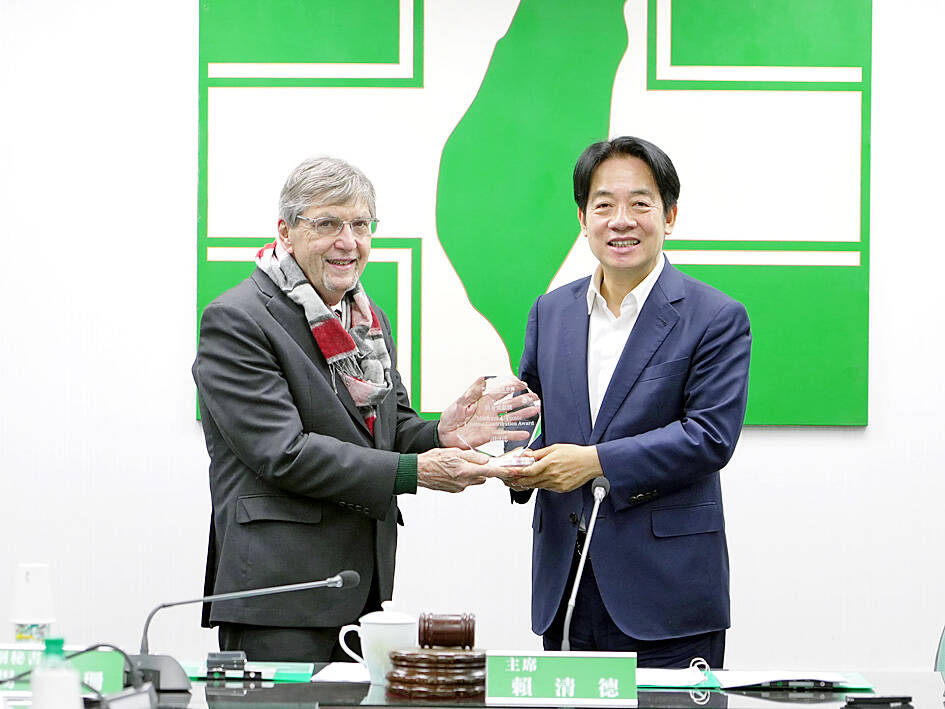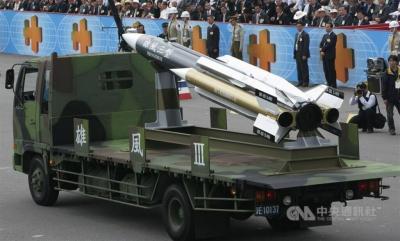After working with more than 10 Democratic Progressive Party (DPP) chairpersons, Michael Fonte, a Brooklyn native who is the director of the DPP’s Washington mission, is set to retire from the position, coinciding with the end of President Tsai Ing-wen’s (蔡英文) tenure.
Over the past decade, Fonte has been working to assist the DPP in understanding US policy and facilitating mutual understanding between the two sides, as well as shedding light on Taiwan’s political landscape for the US.
In a recent media interview, Fonte, 83, said the mission was reinstated in 2013 following a 2011 decision made amid a DPP public relations crisis.

Photo courtesy opf the DPP via CNA
In September that year, a Financial Times story quoted a senior US official expressing significant doubts about then-DPP presidential candidate Tsai’s ability or willingness to uphold peace and stability across the Taiwan Strait. The news story broke while Tsai was visiting Washington in 2011.
During her visit, she met with two members of the US National Security Council — Daniel Russel and Evan Medeiros — said Fonte, who was then the DPP’s liaison in Washington.
Both “weren’t satisfied with her answers” to their questions, Fonte said, adding there was a concern that Tsai might be a Chen Shui-bian (陳水扁) 2.0, under whose presidency from 2000 to 2008, there was heightened tension across the Taiwan Strait amid his pro-independence leaning agenda.
To dispel misconceptions, the DPP re-established its mission in Washington in June 2013, and Fonte became its inaugural director, handling communications between the DPP and the US.
The mission, first established in 1995, closed in 2000 when the DPP came into power, to avoid overlapping with the Taipei Economic and Cultural Representative Office in the US, Taiwan’s de facto embassy in Washington.
Reflecting on his decade of work, Fonte said he believes the mission has made significant strides forward.
His tasks entail regularly holding meetings with high-level US officials and attending events organized by think tanks across the political spectrum.
“I’ve certainly enjoyed myself immensely,” he said, adding that earning the trust of people in Taiwan and the US, as well as being an honest interlocutor has been crucial for effectively carrying out his role.
Fonte first came to Taiwan in 1967 in his 20s, when he served as a Catholic missionary in central Taiwan.
His Hoklo (also known as Taiwanese) teachers taught him the language and gave him a sense of how difficult life was for ethnic Taiwanese under the Chinese Nationalist Party (KMT) government-imposed martial law.
“I went to Taiwan expecting to work on social justice programs, such as community building, to help people improve their lives ... but the problem was, even if I wanted to do that, if anybody worked with me, the government didn’t like that,” he said.
Fonte left Taiwan in 1970 feeling frustrated and began pursuing a degree in Asian studies at the University of Michigan, where he encountered late political dissidents such as Peng Ming-min (彭明敏).
He started to acquaint himself with overseas Taiwanese who were involved in pursuing human rights and democracy.
A year after the formation of the DPP in 1986, the Washington-based National Democratic Institute invited the party founders to visit the capital.
Fonte was invited by Peng to serve as the founders’ “gofer” around the city, given his ability to speak Hoklo.
Fonte said he is stepping down at this time because of age and as he believes Taiwan and US ties have never been closer.
He said that he also owes it to his wife, who has a bucket list of retirement plans she wants to fulfill.

STATS: Taiwan’s average life expectancy of 80.77 years was lower than that of Japan, Singapore and South Korea, but higher than in China, Malaysia and Indonesia Taiwan’s average life expectancy last year increased to 80.77 years, but was still not back to its pre-COVID-19 pandemic peak of 81.32 years in 2020, the Ministry of the Interior said yesterday. The average life expectancy last year increased the 0.54 years from 2023, the ministry said in a statement. For men and women, the average life expectancy last year was 77.42 years and 84.30 years respectively, up 0.48 years and 0.56 years from the previous year. Taiwan’s average life expectancy peaked at 81.32 years in 2020, as the nation was relatively unaffected by the pandemic that year. The metric

Taiwan High Speed Rail Corp. (THSRC) plans to ease strained capacity during peak hours by introducing new fare rules restricting passengers traveling without reserved seats in 2026, company Chairman Shih Che (史哲) said Wednesday. THSRC needs to tackle its capacity issue because there have been several occasions where passengers holding tickets with reserved seats did not make it onto their train in stations packed with individuals traveling without a reserved seat, Shih told reporters in a joint interview in Taipei. Non-reserved seats allow travelers maximum flexibility, but it has led to issues relating to quality of service and safety concerns, especially during

A magnitude 5.1 earthquake struck Chiayi County at 4:37pm today, the Central Weather Administration (CWA) said. The hypocenter was 36.3km southeast of Chiayi County Hall at a depth of 10.4km, CWA data showed. There were no immediate reports of damage resulting from the quake. The intensity of the quake, which gauges the actual effect of a seismic event, measured 4 in Chiayi County, Tainan and Kaohsiung on Taiwan's seven-tier intensity scale, the data showed. The quake had an intensity of 3 in Chiayi City and Yunlin County, while it was measured as 2 in Pingtung, Taitung, Hualien, Changhua, Nantou and Penghu counties, the data

The Supreme Court today rejected an appeal filed by former Air Force officer Shih Chun-cheng (史濬程), convicted of Chinese Communist Party (CCP) espionage, finalizing his sentence at two years and two months for contravening the National Security Act (國家安全法). His other ruling, a ten-month sentence for an additional contravention, was meanwhile overturned and sent to the Taichung branch of the High Court for retrial, the Supreme Court said today. Prosecutors have been notified as Shih is considered a flight risk. Shih was recruited by Chinese Communist Party (CCP) intelligence officials after his retirement in 2008 and appointed as a supervisor